
COMPANY HISTORY - NAUTILUS SA GLARUS & LUGANO
The company was founded in 1938, with the original purpose of financing shipping on Lake Lugano, but apparently little activity was ever developed. Its legal seat was in Glarus, but the head office was in Via Pretorio 7 in Lugano, most likely in the office of the first president, Dr Waldo Riva, who ran his law office at the same address. Later, the company had a branch office at Seestrasse 61 in Zurich (near Enge station). Dr. Waldo Riva (1905 -1987) was a well-known lawyer from Lugano, a politician and high army officer, and also a member of the board of Banco di Roma per la Svizzera, Lugano. He was assisted by Angelo Anastasi and Dr Fontana. Mr Anastasi was a deputy director of the Banca Unione di Credito in Lugano, and at times he also served as British Consul.
After World War II broke out and Switzerland had created its own shipping flag, Nautilus S.A. embarked on the shipping business. It initially acquired the Italian steamer SEMIEN which was interned in Dakar for the proud sum of CHF 10 million from the shipping company Ignazio Messina & Cie of Genoa (which still exists as a successful shipping company). Mr Anastasi had apparently given the impetus to buy the LUGANO, but as British consul wanted to remain in the background, and it was his good relations with Britain that enabled the departure from Dakar.
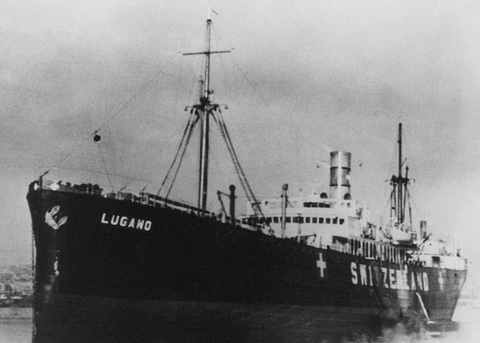
The LUGANO during the war with KTA-funnel and war markings
On 29.04.1942 the freighter was registered under the name LUGANO as number 10 in the Swiss shipping register. With a lifting capacity of 9,200 tons, the LUGANO remained the largest Swiss steamer during the war. Nautilus S.A. had no technical expertise to run the ship, nor did they have enough resources to operate the steamer. For these reasons, it concluded a contract with SRAG, (Schweizerische Reederei AG or Swiss Shipping Company of Basel), to ensure operation. SRAG granted a working loan of CHF 2.5 million and took over the technical and personnel management of the ship. During the war, chartering was carried out by the KTA (Kriegs Transport Amt or War Transport Office) in Bern. The first voyage from Lisbon to Genoa and back apparently realised CHF 898,604 which had to be transferred directly to Basel.
Already by July 1942 the Swiss Embassy in Rome expressed its fears that Messina was in some form or another involved with Nautilus S.A. and that the Swiss company representatives were being abused as its frontmen.
On 03.07.1946 SRAG returned the LUGANO to her owners Nautilus S.A. in the port of Genoa and the company took over the full management of the vessel. After the end of the war, the KTA sold its four ships and in spring 1947 Nautilus acquired the now no longer used vessels SAENTIS, CHASSERAL and ST. GOTTHARD for a total of CHF 3.55 million, operating them all under the same names and under the Swiss flag (the 4th ship, the EIGER, was taken over by SRAG and re-christened as CRISTALLINA). In June of the same year, the shipping company acquired an older American tanker and registered it as CERTENAGO under the Swiss flag.
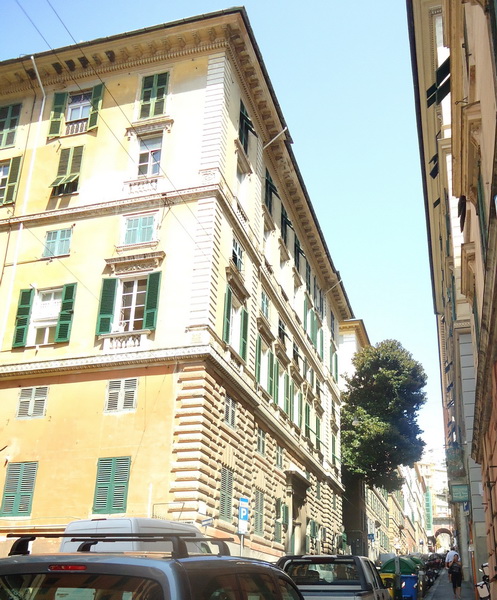
The former Nautilus office in Via Caffaro 12, Genoa in 2014 (Archive Swiss-Ships)
From spring 1947 to August 1949 the Italian shipping company Messina ran Nautilus S.A. and its ships practically at their own discretion. Even the on-board writing paper carried a Messina letterhead, which the consular authorities and the EPD (Federal Department of Foreign Affairs) objected to on several occasions.
After the LUGANO was returned to her owners, Messina employed the steamer for passenger transport to South America and the West Indies without informing the owners or the Swiss authorities. These machinations were absolutely scandalous and harmful to the reputation of Switzerland and one can say that Messina abused our flag. The desolate conditions on board under the direction of Messina generated heated complaints to the authorities in Bern. In April 1948 Nautilus sold, or should one say "returned" the LUGANO to Messina. The main activity of the shipping company was, however, the route to West Africa, the Nautilus Line, inaugurated in 1947 and later operated by Keller Shipping. In 1948, Messina/Nautilus did try to introduce a liner service from Genoa to India, whether on its own initiative by Nautilus or at the instigation of Messina is not known. The ST. GOTTHARD and the CHASSERAL each made one voyage to India in the summer of 1948.
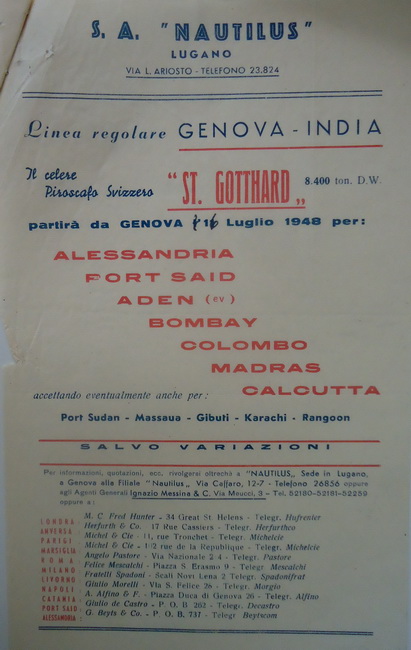
Flyer for the newly opened Genoa-India-Line
In 1949, UTC (Union Trading Company of Basel, known to seamen on the West Africa run for their department stores in Nigeria and Ghana) complained in a letter to the Federal Department of Foreign Affairs in Bern about the Swiss-flagged steamer ST. GOTTHARD, operated by Messina in Genoa. The steamer arrived in Lagos in January 1949 and the captain expected UTC to take over the agency. For good reasons, none of the established agencies in Lagos, including UTC, wanted to accept this mandate. Two years earlier in Takoradi, the captain of the same steamer had begged UTC to help him settle the port expenses. As a result, they had months of trouble getting back their money from Nautilus S.A. UTC therefore demanded a bank guarantee, which however could not possibly be issued in the short time available. The captain begged money from the local Italian community to at least buy fresh water and continue the journey. The Swiss colony not only in Lagos, but also in Ghana was obviously unhappy that the good reputation of the Swiss was brought into disrepute by such behaviour. It was obvious that Nautilus had no control over the machinations of Messina.
In June 1950, the shipping company purchased from G.E.N. (Gestione Esercizio Navi, Genoa) the old cargo steamer TICINO, and their fleet so grew to 6 units. It is assumed that G.E.N. had probably managed the ships technically and commercially for some time. The federal government also demanded in this case a curb the foreign influence. Acting on this request Nautilus S.A. opened a branch office in Genoa in Via Caffaro 12 in 1947. The office, in a prime location in the city centre, was headed by the former Swiss KTA Port Commissioner in Genoa, Christian Bach. However, the KTA complained to the EPD in March 1948 that Mr Bach was still using stationery with the head "Commissariat fédéral du port de Gênes".
G.E.N. belonged to the Vatican business empire and had been founded in 1947 by the Vatican Bank. This shipping company, which operated many ships, was led by Giulio Pacelli, a nephew of Pope Pius XII (1876 - 1958). A second company was G.E.N.S. Gestione Esercizio Navi Sicilia, based in Palermo. Giulio Pacelli was also in a senior position in the Banco di Roma. Dr. Waldo Riva, in turn, also served as Swiss governor of the Equestrian Order of the Holy Sepulchre of Jerusalem, which is directly under the protection of the Vatican. It seems to us that Waldo Riva, who also played a role in other Ticino shipping companies, had exploited his relations with the Vatican.

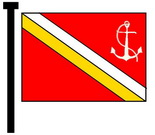
Funnel and house flag of G.E.N. (yellow / white the colours of the vatican)
In 1949 Nautilus was reorganized; the chairman of the board was, as before, Angelo Anastasi, and new to the board came the lawyer Dr med. Bixio Bossi (1896-1990), a member of the Council of States (Senate) for the FDP and Dr Waldo Riva, a member fo the National Council for the CVP). Dr. Luigi Fontana then retired. The share capital was increased from CHF 50,000 to 500,000. The influence of Ignazio Messina was reduced and finally eliminated, but of course Messina saw the matter with completely different eyes, as they still present the case today in their corporate website.
In the course of the Korean crisis when shipping space threatened to become scarce, the federal government carried out an action to increase the Swiss overseas tonnage by 60,000 tons on the basis of the law of 1938 for securing national supply. By a decision made 17-21.11.1950, the Confederation granted loans of up to 75% of the value of each ship.
Although Nautilus was already in financial trouble in 1950, the Confederation helped the company to avert possible bankruptcy and the loss of the ships. The Confederation also feared that the foreign Banco di Roma in Lugano and its affiliated G.E.N. could gain too much influence on Nautilus. In 1951 it acted to allow Nautilus to repay their loans to the Banco di Roma by giving a federal guarantee for six years. Banco di Roma was replaced by loans from the Swiss banks Schweizer Volksbank and Schweizer Kreditanstalt, thus allowing the influence of the Italian bank and the G.E.N. to be removed.
In 1951, the old freighter CHASSERAL and the tanker CERTENAGO were sold, the tanker fetching a relatively good price in January 1951. On this occasion, Nautilus purchased a new, about 6 months old Greek freighter and baptized her BADEN. The purchase price of the BADEN amounted to 3.45 million USD (about CHF 15.0 million), which was already on the border of their financial limits. In Genoa it was rumoured that this purchase rendered large side profits, but no one knew into which pockets they disappeared.
By 1949 Bixio Bossi had learnt, as a member of Council of States, that the federation was desperately seeking interested parties for its lire credits in Italy. With the help of the Federal Government, the company ordered a new freighter specially built for the West African trade in an Italian shipyard with a total value of CHF 11.05 million. With this transaction the government was able to reduce its lire credit with the Italian state by CHF 8.75 million. It should also be mentioned, however, that at that time the same ship in Germany would have cost about the half, but on the other hand, because of the Korean crisis, the freight rates were rising. The remaining CHF 2.3 million was for the original Sulzer engine. The HELVETIA came into service in July 1952 and sailed under the Swiss flag for 26 years.
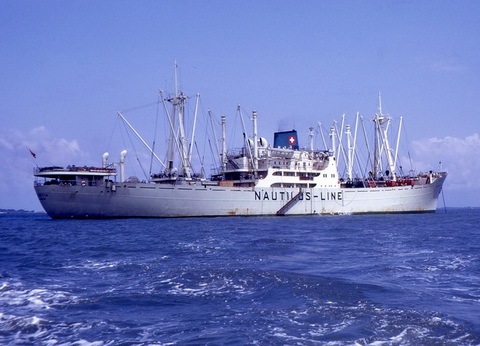
The HELVETIA on the roads in West Africa (Photo: E. Haldimann)
Already when granting the right for Swiss registration for the HELVETIA, the Federal Council had strongly advised increasing the share capital to CHF 5.0 million. But in June 1952, the share capital amounted to only CHF 500,000, of which Bixio Bossi as president of the shipping company held 40%. Emilio Bianchi (a relative of A. Anastasi) held 30% and Angelo Anastasi the remaining 30%. The Board of Directors now only consisted of Bixio Bossi as president and Dr Bianchi (Waldo Riva and A. Anastasi having left). By this time some officials in Bern had their concerns about the financial situation of the company. The extremely high acquisition costs of the two ships BADEN and HELVETIA already burdened the Federal Government with CHF 24.0 million. In addition, the Confederation had guaranteed another CHF 5 million to pay off old bank debts. The shares were pledged to the Federal Government with the Swiss Federal Audit Office supervising the bookkeeping and specifying the use of operating surpluses, which were primarily to be used for the repayment of bank loans. The administration also had a role in decisions on about larger purchases. The planned increase in share capital was however never realised.
In 1953, the Korean War came to an end and the ensuing significant drop in freight rates brought the Lugano-based shipping company into more and more financial distress. For a long time no one knew that Nautilus was involved in a major court case with Messina, and presumably the affair had already begun with the purchase of the LUGANO during the war. An arbitration tribunal awarded a payment of slightly over CHF 3.5 million to Messina, and when Nautilus asked the government for a loan of CHF 2 million to pay Messina, the disaster drew closer. Instead of Bixio Bossi, the Confederation commissioned the Ticino National Councillor Franco Maspoli (1908 -1974), a member of the parliamentary finance committee, to negotiate with Messina: He could reach an out-of-court agreement and the debt was significantly reduced to CHF 2.1 million.
To make matters worse, the financial auditors discovered that a disbursed sum of CHF 106,000.- hadn't been declared in the accounts, but had been paid directly to the shareholders. Confidence in the management of the company was shaken, but what should the federal government do now? Leave the company to its own devices and send it into certain bankruptcy, or hand-over the company into more capable hands? This was no easy question to answer, especially as Bixio Bossi, a long time member of the Council of States and head of a company, was an important and well-known personality in Bern.
The Federal Finance Administration tried to find a solution for the troubled shipping company which would be favourable to the federal government. The persons handling the case were Max Iklé and Bernhard Müller. Dr Max Iklé (1903-1999) was the director of the Federal Finance Administration from 1948 to 1956, and later served on the board of directors of the Swiss National Bank, and was further the father of our first female Federal Councillor, Mrs. Elisabeth Kopp. Advocate Bernhard Müller (1921-2006) was head of the legal department of the Federal Department of Finance.
The Finance Administration entered into negotiations with Transoceanique S.A. Geneva to try and reach a Swiss solution to the problem. This company was controlled by Charles Keller (1900-1992), the owner of Keller Shipping AG, Basel and which also owned the new freighter GENERAL DUFOUR. The company was close to the Geneva private bank Lombard, Odier & Cie whose board of directors consisted of Jean Bonna and Edmond Barbey, both bankers in Geneva, and Charles Keller himself. Meanwhile, Bixio Bossi negotiated with a "Gruppe Jäger", which had also expressed interest in Nautilus, but apparently these were foreigners with Mr Jäger being only the Swiss frontman.


Dr. Bixio Bossi, member of the Council of States Dr. Max Iklé, later director SNB
(Photos "Zürcher Woche")
On a trip to Genoa in August 1953 Charles Keller paid a courtesy visit to the office of Nautilus Genoa, where he incidentally met the attorney Bernhard Müller of the Federal Finance Administration. In the spring of 1954, the Confederation first addressed Transoceanique with the question as to whether they would be willing to take over the fleet of Nautilus.
On 01.07.1954 Keller Shipping AG, Basel took over the full commercial and technical management of the Nautilus ships. At the time of this take-over Nautilus owned five ships, but the ST. GOTTHARD and the TICINO were sold shortly afterwards, presumably at the instigation of Charles Keller, while HELVETIA, BADEN and SAENTIS continued for many years under the flag of Keller Shipping. According to an entry in the Swiss Official Gazette of 09.08.1954 the Board of Directors of Nautilus S.A. was now staffed by people trusted by Charles Keller. The new President was Jean Ernst Bonna, followed by Edmond Barbey with Charles Keller becoming Delegate. Bixio Bossi was allowed to remain on the board, but now had only collective signature rights. In 1955 Transoceanique S.A. took-over all the shares of Nautilus S.A. Lugano and thus their ships.
The adventure had cost the Confederation probably CHF 19 million, but to determine this exactly is almost impossible today. In addition, the value of the fleet was estimated in retrospect, at a time when the freight rates were extremely low. The Italian experts calculated a total value of approximately CHF 10.0 million. However, the federal government expected an estimate of around CHF 20 million, as the fleet accounted for CHF 29.0 million in their books - some people in the federal house certainly made long faces. Transoceanique S.A. however, agreed with the federal government on a payment of CHF 12.0 million for the ships.
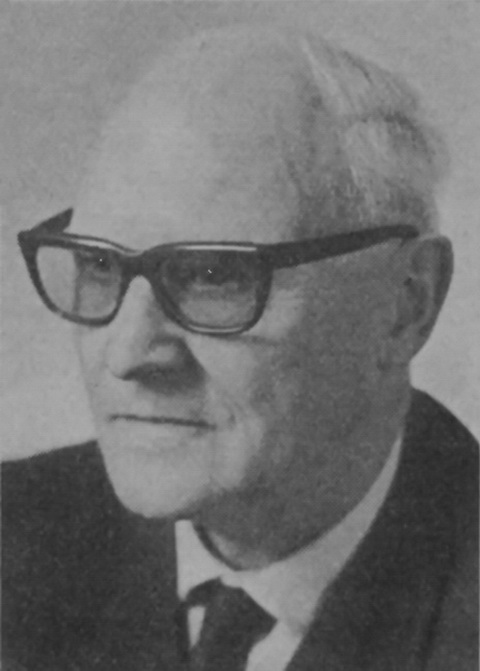
Charles Marcel Keller-Gysin (Photo Strom + See)
In 1955, when freight rates had started to pick up again and the takeover of Nautilus had since long been completed, Bixio Bossi regretted his decision to be lured imprudently into this deal and in 1956 he published a 62-page exposé in which he accused the two federal officials Max Iklé and Bernhard Müller of fraud at the expense of Nautilus. He distributed this report widely in the Federal Parliament and to the press. Thus, began the so-called "Nautilus Affair", which would keep the courts and the public busy for about the next 10 years. The two officials did not accept the accusations and finally sued Bossi for defamation. It seems that at that time the newspaper "Die Tat" (the Migros newspaper, whose founder Gottlieb Duttweiler was certainly very keen to bring this story to the public) was instrumental in the detection and publication of this affair, which our authorities had been able to hold under cover for years.
The Federal Council set up a federal commission of inquiry led by Emil Schmid, Bernese Chief Justice, along with Robert Grimm, a member of the board of directors of Swiss Shipping Company, Basel and Dr. Heinrich Wachter, formerly in a leading position in the global trading firm Gebr. Volkart, Winterthur. Some of the most important issues raised were:
- The loan to Nautilus in 1950/51;
- Had the reorganization in 1954 not been better negotiated?
- Why were other companies not asked for tender?
- Could the Federation claim damages against the former Nautilus administration?
On 23.10.1956, Federal Councillor Streuli of the Department of Finance and Customs was forced to convene a press conference in order to inform in detail about the affair. Unfortunately, the SMNO, Swiss Maritime Navigation Office, Basel was never consulted or asked for advice in this matter.
Better than many words, the following table from the investigation report shows the situation of the federal loans as of 18.02.1954:
| Shipping company | Loan amount | Loan repayment | Loan repayment in % |
|---|---|---|---|
| Suisse-Atlantique | 15,447,000.- | 3,885,000.- | 25.15 % |
| Alpina (SRAG) | 15,562,462.- | 300,462.- | 1.93 % |
| Nautilus | 24,035,109.- | --------- | --- % |
| Suisse-Outremer | 6,185,477.- | 910,'477.- | 14.72 % |
| Transoceanique (Keller) | 4,900,000.- | 1,600,000.- | 32.65 % |
| Reederei Zürich (Migros) | 12,000,000.- | 1,200,000.- | 10.00 % |
Nautilus could not be awarded to Suisse-Atlantique for purely commercial reasons. Suisse-Atlantique, which was mainly active in the grain trade, would have had a hard time with a liner shipping company. Alpina struggled with its own difficluties, Suisse-Outremer had only recently entered the business and a takeover by the Migros was not considered anyway. So only Transoceanique with Keller Shipping remained.
The defamation suit of Max Iklé and Bernhard Müller against Bixio Bossi took place in the district court of Bern in February 1958. Bossi was convicted in the first instance and a year later the Bern Supreme Court confirmed the verdict. The main witness, Charles Keller, had testified that at Nautilus there was obviously considerable mismanagement, the organization was "catastrophic", the conditions of the vessels were bad, insurance premiums were paid twice as high as necessary, suppliers made special surcharges (corruption) and most agents had to be sent "to hell". In the end, Keller said boldly, "without me and my organization, the Nautilus would be worth nothing today."
In reply to a parliamentary question in February 1958, the Federal Council stated that thanks to the improved freight situation, but also thanks to the good and efficient management of Keller Shipping, the situation of Nautilus had improved significantly. Also, exponents of the new Nautilus stated that the losses of the federal government were being made good again.
In April 1959, the Federal Attorney's Office sued Bixio Bossi for fraud on behalf of the Federation, but he was acquitted on 13.11.1964 by the Berne Penal Court or as the "Zurich Week" then wrote in a longer article "the Federal Prosecutor received a clip on the ear and the Federal Council given a very broad hint", as federal officials had been well informed over all the years about the precarious situation of the Nautilus. Obviously, it was felt that this matter could have been brought to a better conclusion. It is difficult to judge this affair today, above all as we do not know the characters of these actors, e.g. was Bossi boundlessly naive or simply a cunning businessman? There was no doubt that Charles Keller was a clever old fox who could obtain a good deal for Keller Shipping, increasing his small fleet by a considerable amount. The officials from Bern were not proved wrong with their decisions, as Keller Shipping proved itself successfully for many years in their liner business to West Africa and Portugal. However, the tide turned in the nineties, but that's another story.
On 17.02.1964 the total share capital of CHF 500'000.- of Nautilus S.A. Geneva (c/o Keller Shipping, Basel) was transferred to Transoceanique Suisse S.A. Geneva.
Source: Documents from the Federal Archives, Bern
SwissShips HPS, NB February 2019